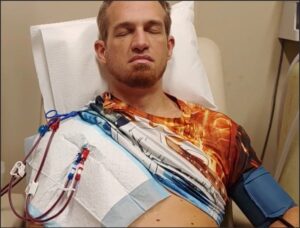This is the second of three posts about COVID and kidney transplants.
James A. Bacon
In January Stafford County resident Shamgar Connors, who has undergone kidney dialysis for nearly three years, engaged in an annual consultation with the University of Virginia Health system’s organ transplant team. His conversation with Dr. Karen Warburton went like this:
Warburton: [A social worker] said you’re not interested in the COVID vaccine. It is a requirement for you to be active–
Connors: I just had COVID, so I don’t know, why would I get the vaccine?
Warburton: You may have had Delta, and that may not protect you against the Omicron variant, which is what we’re seeing now. Also, our policy is, in order to have people active on the transplant list and get a transplant, you need to be fully vaccinated. You’re on the list. You’re just not on active status right now, as we tied up all these other loose ends. In order to be activated on the list, you will need to get the vaccine. … Are you willing to do it? [silence] OK, so, you don’t want to move forward?
Connors: I’d rather die of kidney failure than get the vaccine.
The hospital made no exceptions, Warburton said. “The science is pretty clear. We have seen so many people die from COVID that we’re requiring it.”
Connors: If you want to talk about science, I can show you a bunch of reports that show you what the science shows about the vaccines. Myocarditis, however you pronounce it… all sorts of problems go with it. And I just had COVID, and I got over it. I’m not scared. You have a ninety-nine point nine nine nine seven percent chance to survive.
Warburton: That’s all pretty inaccurate. It’s obviously your choice, but it’s not your choice if you want to be active on this.
Scenes like that are playing out across the United States. Hospitals are denying critically ill patients access to organ transplants if they refuse to get fully vaccinated. Transplant patients take immune-suppression drugs to prevent the body from rejecting the new organ. There are significant risks of viral infection for six months to a year after the transplant. Hospitals view the vaccine as a way to increase survival rates for transplant patients. But people are refusing the vaccination anyway.
Here in Virginia, one in ten people over 18 years and older has yet to be vaccinated with a single dose. In Connors’ age range, the percentage is about 17%. These people reject the idea of getting vaccinated on religious or philosophical grounds. Now some face a true test of conscience. If they don’t comply, they face the prospect of being denied life-saving medical treatment.
Religious beliefs blend with increasing distrust of “expert” opinion. Once upon a time, Americans treated doctors’ advice like the word from on high. In the age of the Internet, patients have access to a vast range of information, including copies of the latest medical studies, and they are asking more questions. Ordinary Americans may not be qualified to interpret research findings, but millions have lost faith in official guidance, which, in the case of COVID-19, has often been flawed — don’t wear masks and then do wear them; two weeks to slow the spread; two shots will give you immunity, etc. Scientific studies draw conflicting conclusions, ambiguity abounds, and the formulation of new guidelines often lags the evolution of the virus. The political class might conceivably be right about the the need for vaccination mandates, but it has squandered its credibility.
The donor kidney shortage. Pervasive mistrust creates a problem for organ transplant surgeons. In 2018 more than 550,000 Americans were on long-term dialysis therapy. Today, more than 100,000 are waiting for a kidney transplant. Transplantable kidneys are in such short supply that nearly two dozen eligible patients die every day waiting for the right organ to become available. Given the scarcity, kidneys must be rationed. Hospitals favor patients who have the highest likelihood of surviving the operation.
“Improvement of long-term survival is a major goal for researchers, clinicians, and patients,” write Sundaram Hariharan and colleagues in the Aug. 19, 2021 issue of the New England Journal of Medicine.
A variety of medical factors affect the survival rate, including HIV infection, hepatitis C infection, diabetes, obesity, hypertension, and advanced age. Viral infection, including COVID, is also a significant risk, the authors say.
Influenza infections are common among kidney transplant recipients. Currently, however, the coronavirus disease 2019 (Covid-19) pandemic represents a serious threat to patients who have undergone kidney transplantation…. A Covid-19 mortality rate of 13 to 32% has been reported among transplant recipients. Strict adherence to the Centers for Disease Control and Prevention guidelines for Covid-19 prevention is mandatory for this patient population…. A preliminary report shows that administration of two doses of Covid-19 vaccine in immunosuppressed transplant recipients reduces the rate and severity of infection with SARS-CoV02. However, the antibody response after two doses may be insufficient, especially among transplant recipients who are receiving antimetabolite treatment, and can be augmented by a third dose.
Sundaram et al. do not differentiate, however, between unvaccinated patients with naturally-acquired immunities and those with none.
The 13% to 32% mortality rate for transplant patients with COVID cited above implies a survival rate of 68% to 87%. That compares to a five-year survival rate of patients receiving a kidney from a deceased donor of 78.2% (between 2012 and 2015), and from a living donor of 88.1%, according to an article on the Hennepin Healthcare Research Institute website. The article stresses the advantages of COVID vaccination, but it’s not clear from Hennepin’s presentation that the survival rate for all patients is much higher than for COVID patients. More importantly, like the Sundaram article, Hennepin fails to differentiate between unvaccinated COVID patients who have natural immunities and those who don’t.
UVa Health’s response. Bacon’s Rebellion asked Lisa Badeau, chief communications officer for UVa Health, to speak with someone about the medical and ethical considerations involved in the decision to deny kidney transplants to COVID survivors. She did not respond to our email.
However, Henrico County resident Walter Smith has obtained a response from the University of Virginia through the Freedom of Information Act. Smith was trying to uncover the scientific justification behind the the university’s vaccination mandate for students, faculty and staff. He requested any documents bearing upon the merits of vaccination-acquired immunity compared to naturally-acquired immunity. The FOIA office provided a summary of research bearing on the issue.
The FOIA officer’s response reflects the ambiguities and uncertainty in that research.
There is ongoing interest in vaccination vs infection inducted immunity. I’d conclude that remains an area of study that continues to evolve with new variants, vaccine schedules, and combinations of infection and vaccination…. Although debated, it’s incorrect to state that all studies suggest that natural immunity [is] far superior to vaccine induced immunity. Most (but not all) studies suggest vaccination is equivalent or superior to post-infection induced immunity. Moreover, there is compelling evidence that the best immune responses occur in those who are vaccinated after infection.
So, not all studies agree that natural immunity is far superior, just some. Implicit in the statement is that some studies have concluded that naturally- acquired immunity, if not superior to, is equal to vaccination-induced immunity. Such a conclusion is reinforced by summaries and links to specific medical studies cited in the FOIA response.
Smith did not raise the issue of COVID immunity for transplant patients, however, and the UVa FOIA officer did not address it either.
Recent research. New COVID studies are published on a near-daily basis, and the science continues to evolve. Connors points to a post in The Blaze, a conservative website, which reports on an article published in the Journal of Infectious Diseases. The authors of the academic article focused on the T-cell response of transplant patients with vaccinations versus a control group of patients with naturally-acquired immunities. The Blaze author cited this quote: “These results suggest that [solid organ transplant recipients] generate robust T-cell responses following natural infection that correlate with disease severity but generate comparatively lower T-cell responses following mRNA vaccination.”
Chalk up another study supporting acquired immunity? Perhaps. It is worth noting that the researchers are affiliated with the Ajmera Transplant Center, University Health Network (UHN), in Toronto, and that Ajmera continues to advise transplant patients to get vaccinated. Says the website: “All patients should have received three doses of vaccine as their primary series. if you have not received a third dose, you should receive it immediately.”
How big a risk factor? Kidneys are scarce. Most people would agree that the organs should go to patients with the best odds of long-term survival. In my research for this article, however, I could find no source that compares the mortality risk of organ transplant patients with naturally-acquired COVID immunity to the mortality risk of patients with hepatitis, HIV, diabetes, hypertension or obesity. If the research showed that COVID survivors with natural immunities have a demonstrably lower survival rate than patients coping with those other risk factors, then mandatory vaccination might make sense from a medical point of view. But what if they survive at a higher rate than patients with diabetes, even if a vaccination would boost their survivability even more? Upon what practical or moral grounds would it make sense to deny them a transplant in favor of, say, a diabetic?
The mandate vaxxers make the argument that full vaccination + natural immunity is better than natural immunity alone. Therefore, everyone should be required to get the three shots. By that logic, shouldn’t patients with diabetes be denied transplants until their diabetes is under control? Shouldn’t obese patients be required to lose weight before getting a transplant?
Sundaram et al. note that the 5- and 10-year survival rate for U.S. kidney recipients varies by race: 77% and 56% for Whites, 73% and 48% for Hispanics, and 62% and 34% for Blacks. While Blacks have a measurably lower survival rate, no one would suggest that Blacks be discriminated against on the basis of their race. But religion is another matter. Religious belief may be protected in the U.S. Constitution, but Connors’ religious convictions win him no exemption.
The third installation of this series explores Connors’ religious objections to the vaccine mandate.




